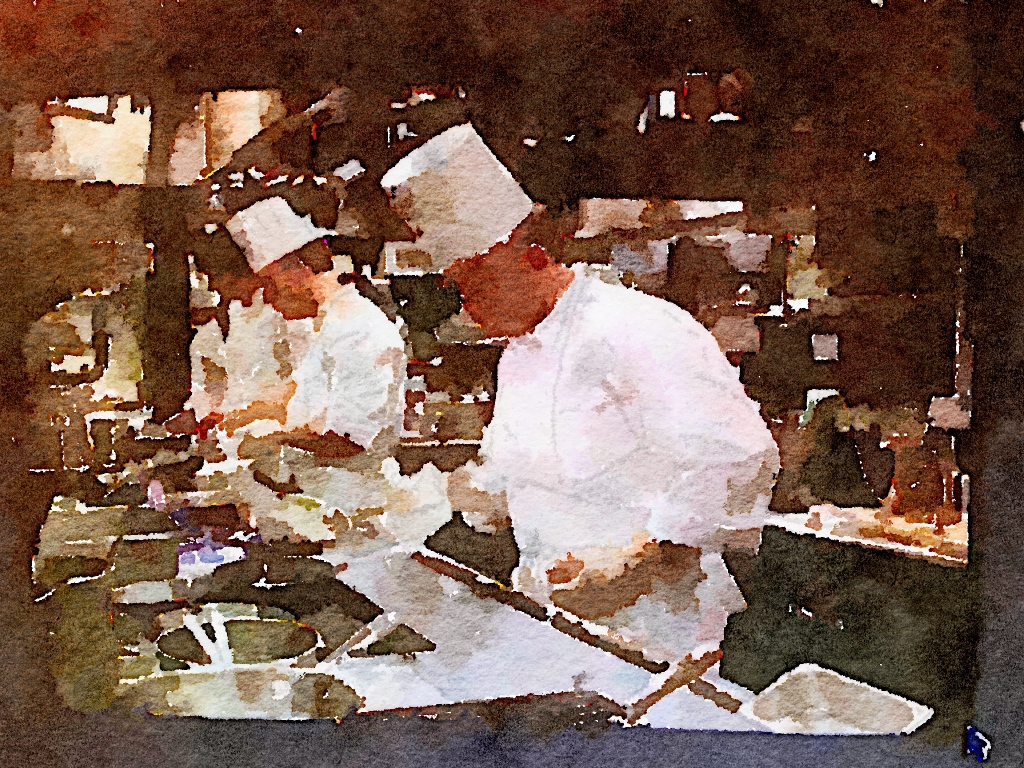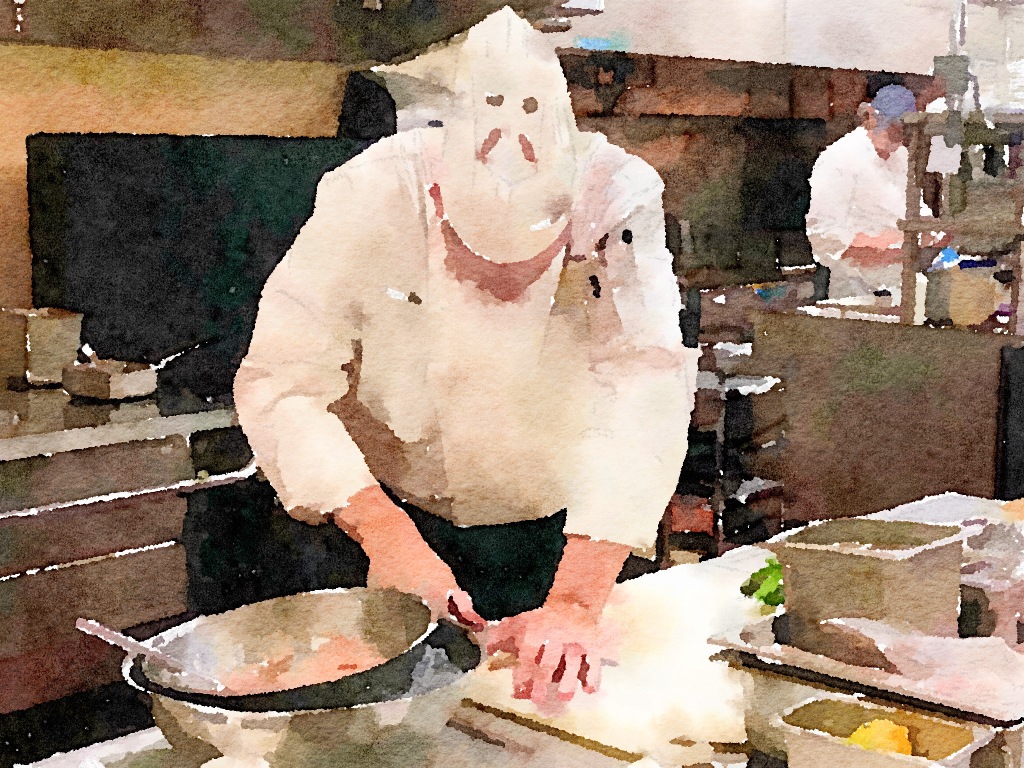
Sweat was creeping down Alex’s back. The line was just 15 minutes into the 7 o’clock push and the board was full. The pressure was on, but Alex was on his game – he was wearing an ear-to-ear smile because he knew he was in the zone. The line team was in total sync: Alex looked at his sous chef expediting on the other side of the pass – his eyes said: bring it on chef.
This has been a long haul for the eager, confident line cook who started out three years ago as a dishwasher. It was that part-time job in his senior year of high school, diving for pearls on weekends and an occasional weeknight that gave Alex a level of confidence that was lacking in his life. He would graduate from school, but not because he was a stellar student, but simply because he promised his parents that he would. School actually came easy for him, but it just wasn’t his thing. Working, sore muscles sweat, aching feet – this is what gave him a sense of purpose.
The light bulb went off the summer after graduation when he finished his third consecutive week of 50 plus hours on dishes – the chef called Alex into his office and sat him down. “Alex, I really like your work ethic, the fact that I can always count on you to be here and work your hardest is incredibly valuable to me and the team. I just don’t think that you are working to the level of your ability. You’ve washed enough dishes – it’s time to learn how to cook.” From that moment on Alex knew that his career choice had been made.
This is how so many cooks are made. Even those who have the opportunity to take the time to attend culinary school, if they are truly committed, started out just like Alex. It has been said many times that career cooks don’t choose their profession – it chooses them.
Alex spent a year as a prep cook – this is where he learned how to identify ingredients and judge their quality, proper food safety and sanitation, how to set-up a work station, sharpen and care for knives, the dimensions on vegetable cuts, how to make a perfect stock, all of the cooking methods, fabricate a chicken, cut steaks, bone out a ham, fillet round and flat fish, open clams and oysters, turn potatoes, build flavors, and create an array of sauces from the bold stocks that he made. Most importantly he discovered how to organize his work, be consistent, meet the standards of the operation, and build some speed. After a year of this important routine – he was ready for the line.

Things were a bit rough at first. Alex had become accustomed to working independently – playing his skills against the clock and the constantly expanding prep list, but now he had to depend on others. The whole concept of team was something that would take adjustment time. He started on the fry station where his focus was on a few bar appetizers, pommes frites, and an occasional deep fried entrée. When other stations depleted their mise en place Alex would jump in to chop fines herbs, portion extra proteins, clarify butter, or simply line up plates or fold extra side towels. This was a valuable experience since he had the chance to watch how every other station operated. At first it seemed impossible: “How do they keep all of those orders timed properly, seasoned appropriately, and always looking perfect at the time of plating?” After a few months he had a pretty good picture of how it all worked and his comfort level improved dramatically. Now he was pulled into the grill station on a reasonably slow night when the normal station cook was ill and couldn’t make it in for his shift. Alex understood degrees of doneness, but keeping a chargrill organized with multiple degrees of doneness, making sure that those hash marks from the grill were spot on, and taking carry over cooking into account was overwhelming. He made it through that first night with only three re-fires, but it was rough.
The chef made sure that from that point on – Alex was scheduled one night per week on the grill. Practice makes perfect and in no time he had built a high level of competence and confidence. Alex saw that the chef was determined to build him into a roundsman – a cook who could work many stations with a high level of skill. For the first time since washing that first dish while in high school, Alex saw the kitchen as a likely career – one that might even lead to the chef’s position at some point.
Another few months and the chef pulled Alex off of the hot line and scheduled him to shadow the Garde Manger. “You need to learn the cold side of the kitchen as well. Garde Manger is where we make our profit. Salads, appetizers, and desserts are the “extras” that help to turn a restaurant into a successful one. This is also where you will fine tune your skill at plate presentations.”
To Alex, this seemed like a demotion. The hot line was where the action was, where teamwork was built, and where the sweat from hard work was most evident. Garde Manger seemed too light for a cook on the rise. He would work with Sally who had been at the restaurant for three years – the last two in Garde Manger. Alex quickly saw that the shear number of components that Sally had to work with made the grill station look like child’s play. Everything had its own process, most of which fell on Sally’s shoulders unlike the hot line that was serviced by the prep cook. There were marinades, dressings, poached fruits, sauce reductions, delicate garnishes, artisan cheeses of all types, croustades, washed and spun greens, shucked oysters and clams, poached lobster, pates, and galantines, and the assembly of some pretty intricate desserts that were prepped by the pastry chef in the early morning hours. It was a lot to organize and assemble – Sally did it so well, with so much finesse. Alex’s learning curve would be steep. He dove into the challenge and learned to admire Sally’s skill more and more every day. He would later find out that she too started on the hot line, but now preferred her artistic station.

Through his on-going training rotation Alex felt himself grow into each position, earn respect from his peers, and slowly become a very good and extremely valuable member of the restaurant kitchen team. After three solid months in Garde Manger the chef called Alex in to the office. “Alex, I am very pleased to see how much you have grown and how confident your teammates are in your skill set. I want to take a step back for the next month and schedule you back in the dish room. You will start there on Monday.” The chef left it at that without any explanation. Alex was crushed and confused. “This is where I was two years ago. I thought I was doing a really good job in the kitchen – why is the chef doing this?” A bit of anger crept into Alex’s psyche and as he walked home he even gave thought to quitting this job and looking to a different restaurant. The next day, however, he returned to the kitchen thinking that he would show the chef that he was much more talented than wasting his abilities on diving for pearls.
What happened in that first week of dishwashing was both enlightening and humbling. He began to see the position differently now – he looked at the importance of the dishwasher through the eyes of the cook. It wasn’t sufficient just to wash sauté pans for the middle station – he wanted to make sure that they were stacked in line with the cooks mise en place, handles pointing a certain way, scrubbed till they glistened, and always perfectly dry before they hit the deep blue flame from the stove. He made extra sure that plates were perfectly clean, dry, and free of chips and cracks. He knew now how frustrating it was for a cook to pick up a plate and find out it wasn’t suitable for the assembly of a dish. He took the time to show servers just how important it was to properly scrape and stack dirty plates to keep the system working well, and he was always on the look out for floor spills that could endanger a cook or server. He quickly slipped into the role of an excellent dishwasher.
After two weeks, the chef called Alex into the office again. “You may have wondered why I put you back in the dish area after two years of cooks training. I think you see now that the objective was to give you a different perspective on how important that position is to the operation of the kitchen. A great dishwasher can lead to success and a poor one can bring a kitchen down. I guarantee you that from this point on you will never take the position for granted. Tomorrow you will begin to learn sauté – our most complicated line position.”
It has been three months now since Alex started on sauté. He is exceptional at the work, incredibly well organized, spot on as a teammate, and well rounded with his understanding of cooking. When his look passed on to the expeditor said: “bring it on”, it was because Alex was a confident and competent cook who learned through the school of hard knocks. He loved what he did and knew that the chef could depend on him to jump into any position where he was needed – even the dish room. Alex could see into the future and knew that it wouldn’t be long before that first sous chef position came his way.
There is no better way to learn the ropes, become excellent at your craft, and set the stage for a long and fruitful career than learning by doing. All of these steps are essential. Look for the opportunities, accept the challenges, enter each phase with an open mind, and build your repertoire in a methodical fashion. The world is your oyster.
PLAN BETTER – TRAIN HARDER
Harvest America Ventures, LLC
One Step at a Time
www.harvestamericacues.com BLOG
CAFÉ Talks Podcast

Leave a comment